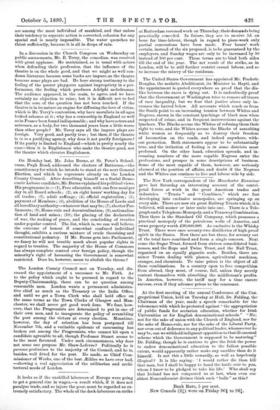In a discussion in the Church Congress on Wednesday on
public amusements, Mr. E. Terry, the comedian, was received with great applause. He maintained, as is usual with actors when defending their profession, that the influence of the theatre is on the whole good, and that we might as well con- demn literature because some books are impure, as the theatre because some plays are bad. He bore strong testimony to the feeling of the poorer playgoers against impropriety in a per- formance, the feeling which produces Adelphi melodramas. The audience appeared, in the main, to agree, and we have certainly no objection to raise; but it is difficult not to feel that the core of the question has not been touched. If the theatre is in its nature an engine for diffusing the love of virtue, which is Mr. Teriy's contention, why have moralists in all ages looked askance at it; why has a censorship in England as well as in France been found indispensable ; and why have actors and actresses, as a body, for two thousand years been a little worse than other people P Mr. Terry says all the impure plays are foreign. Very good, and partly true ; but then, if the theatre is in se a purifying agency, why does it not purify foreigners ? If its purity is limited to England—which is pretty nearly the case—then it is Englishmen who make the theatre good, not the theatre which elevates Englishmen.






































 Previous page
Previous page